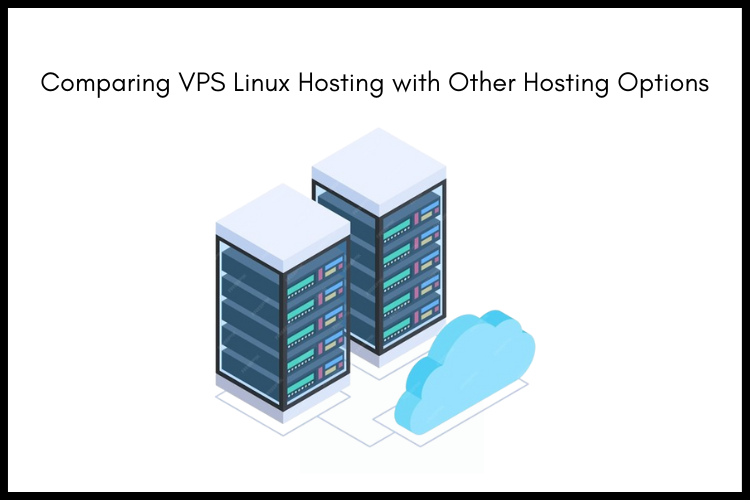In the ever-evolving digital landscape, selecting the right hosting solution for your website is crucial. Among the myriad options available, VPS Linux Hosting stands out as a top choice for businesses and individuals looking for reliability, performance, and control.
This article will delve into the myriad reasons why VPS Linux Hosting is the optimal choice for your website needs, covering aspects from security to customization and everything in between.
Understanding VPS Hosting
Virtual Private Server (VPS) hosting is a type of hosting solution that bridges the gap between shared hosting and dedicated servers. In a VPS setup, a single physical server is partitioned into multiple virtual servers, each acting independently with its own operating system, resources, and software. This setup offers a middle ground, providing the benefits of both shared and dedicated hosting.
Advantages of VPS Hosting
- Cost-Effectiveness: VPS hosting is more affordable than dedicated hosting while offering similar levels of control and performance.
- Scalability: Easily scale resources up or down based on your website’s needs without experiencing downtime.
- Isolation: Each VPS operates independently, ensuring that issues on one server don’t affect others.

Why Choose Linux for VPS Hosting?
The open-source Linux operating system is renowned for its dependability, security, and adaptability. When combined with VPS hosting, Linux offers numerous advantages that make it the preferred choice for developers and businesses alike.
1: Open-Source Flexibility
Linux’s open-source nature allows users to modify and customize the operating system to suit their specific needs. This flexibility is particularly beneficial for developers who require a tailored environment for their applications.
- Customizable Environment: With Linux, you can install and configure software packages as needed, providing a customizable environment that can adapt to your unique requirements.
- Wide Range of Distributions: Linux offers a variety of distributions (distros) such as Ubuntu, CentOS, and Debian, each catering to different needs and preferences.
2: Robust Security Features
Everyone who owns a website should put security first. Linux is renowned for its robust security features, making it a preferred choice for VPS hosting.
- Regular Updates: Linux receives frequent updates and patches from a global community of developers, ensuring that security vulnerabilities are addressed promptly.
- Enhanced Security Tools: With Linux, you have access to a wide array of security tools and features, including firewalls, intrusion detection systems, and advanced encryption techniques.
3: Superior Performance and Stability
Linux is designed to be lightweight and efficient, which translates into superior performance and stability for your website.
- Efficient Resource Management: Linux is known for its efficient use of resources, allowing your VPS to handle more traffic and processes without slowing down.
- Minimal Downtime: The stability of Linux reduces the likelihood of crashes and downtime, ensuring your website remains accessible to users at all times.
4: Cost-Effective Solution
Linux is a cost-effective solution for VPS hosting due to its open-source nature and low resource requirements.
- No Licensing Fees: Unlike other operating systems, Linux does not require expensive licensing fees, reducing overall hosting costs.
- Lower Hardware Requirements: Linux can run efficiently on lower-end hardware, allowing you to save on server costs without compromising performance.
Comparing VPS Linux Hosting with Other Hosting Options
When deciding on a hosting solution, it’s essential to compare VPS Linux Hosting with other available options to understand its unique benefits.

VPS Linux vs. Shared Hosting
- Performance: VPS Linux Hosting offers better performance than shared hosting as resources are not shared with other websites.
- Control: With VPS Linux Hosting, you have full root access to the server, allowing for greater control over software and configurations.
VPS Linux vs. Dedicated Hosting
- Cost: VPS Linux Hosting is more affordable than dedicated hosting, making it accessible for businesses with limited budgets.
- Scalability: VPS allows for easier scalability compared to dedicated hosting, which may require hardware upgrades.
Choosing the Right Linux Distribution for Your VPS
Selecting the right Linux distribution for your VPS is crucial for maximizing performance and efficiency. Here are a few popular distributions to consider:
1. Ubuntu
Ubuntu is one of the most popular Linux distributions due to its user-friendly interface and extensive community support. It is an excellent choice for beginners and those looking for a straightforward setup process.
2. CentOS
CentOS is known for its stability and reliability, making it a popular choice for businesses and developers seeking a robust server environment. It is particularly well-suited for hosting enterprise-level applications.
3. Debian
Debian is renowned for its stability and security features. It is an excellent choice for those looking for a reliable and secure environment for their VPS.
Conclusion
In conclusion, VPS Linux Hosting offers a powerful, flexible, and cost-effective solution for hosting your website. Its combination of security, performance, and control makes it an ideal choice for businesses and developers looking to maximize their online presence. By choosing the right Linux distribution and taking advantage of the numerous benefits offered by VPS hosting, you can ensure that your website remains fast, secure, and scalable.
Frequently Asked Questions
Q1. Which Linux distribution should I choose for my VPS?
Popular choices include Ubuntu for its user-friendliness, CentOS for stability, and Debian for security.
Q2. Do I need technical expertise to manage a Linux VPS?
Basic technical knowledge is helpful, but many hosting providers offer managed services to assist with server management.
Q3. How does VPS hosting improve website performance?
VPS hosting provides dedicated resources, which reduces the risk of performance issues caused by other websites sharing the same server.


